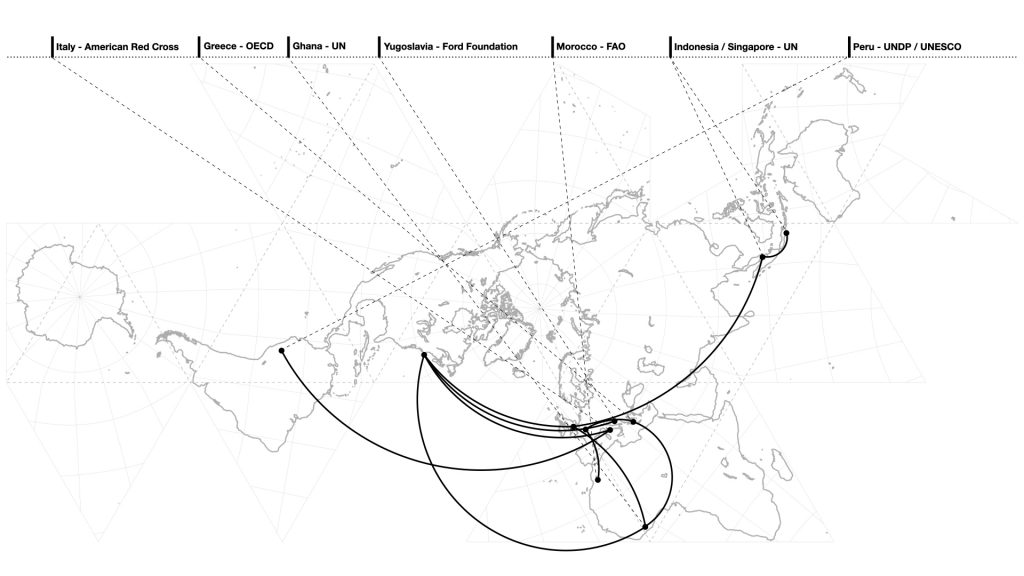Experts, Exports, and the Global Entanglements of Postwar Planning
Coordinators:
Filippo De Dominicis (University of L’Aquila – Italy)
Ines Tolic (University of Bologna – Italy)

Abstract
After the conferences in Bretton Woods (1944) and San Francisco (1945), and especially with the implementation of widespread technical assistance policies of the Point Four Program (1949), teams of experts composed primarily of architects, but also economists, sociologists and anthropologists, began to gravitate around supranational organisations such as the United Nations, the World Bank and the Ford and Rockefeller Foundations. A key centre of focus of their interest was that new independent world that emerged from colonial rule and stepped onto the global stage for the first time in search of legitimacy and technical emancipation. In fact, in 1950 the first technical mission of the United Nations in South-East Asia began, and in 1951 the United Nations Technical Assistance Board was established. That same year, the conference of American planners in Pittsburgh devoted part of its meetings to development aid issues, with speeches by Ernest Weissmann, Jaqueline Tyrwhitt and Antonio Cruz Kayanan. In 1952 UNESCO organised a symposium on the application and extensibility of ‘tropical’ architecture techniques, a topic of great importance for the management of the post-colonial transition. In 1953 the United Nations established the first regional office for technical assistance in India, entrusting Tyrwhitt with its management. In this capacity, the expert coordinated a seminar-exhibition on housing and community improvement that opened in New Delhi in January 1954. At the same time, the International Federation for Housing and Town Planning organised the South East Asia Regional Conference with the goal of systematising what had been done so far in the field of assistance. In addition to Weissmann and Tyrwhitt, the event was attended by well-known and lesser-known names from the contemporary design landscape (including the inevitable Crane and Doxiadis, but also Jane Drew and Maxwell Fry, Charles Abrams, Arieh Sharon and others), all engaged in community development and planning in Pakistan, India, Indonesia, Burma, Malaysia, Singapore, Israel, Jordan, Ghana, Puerto Rico and the Philippines. At the conclusion of the seminar, Weissmann stressed the urgency of new solutions, extensive and robust, that can grasp the spirit of what has been developed so far by individual communities. It is interesting to note that over the years housing initiatives were recontextualised within the broader theme of planning to finally embrace the regional dimension at the Tokyo UN Regional Seminar in 1958. As the operational dimension grew, the geographical scope of reference also changed. Against the growing and consolidating East-West contraposition, the exclusive interest in the settlement condition of South-East Asia left room for broader development strategies. The modernisation of third countries, a flagship of international policy in the early 1960s, opened the door to a holistic and intrinsically global approach, culminating in projects such as Doxiadis’s Ecumenopolis. Building on this foundation, the thematic node aims to investigate the role supranational organisations played in the design discourse and the rise of ‘global experts’ especially but not exclusively in the aftermath of WWII. Researchers are invited to draw on case studies such as development plans and housing schemes, but also events related to dissemination or training programmes – in order to critically frame the profile of the ‘global expert’ and the legacy of their actions in the contemporary world.
Seminars
30 Sept. 2021
Monica Pacheco (Instituto Universitário de Lisboa – Portugal) The Role of Technical Assistance Programmes in Postwar International Development: the Case of Abrams, Koenigsberger and Bodyansky in Ghana. ( Link )
7 Oct. 2021
Anna Paola Pola (Tongji University, Shanghai – China) Global Experts for Historic Towns. The Italian Contribution to UNESCO and UNDP in Latin America. ( Link )
14 Oct. 2021
Michele Tenzon (University of Liverpool – UK)Foreign Aid in the Moroccan Third Agrarian Age. (Link)
21 Oct. 2021
Vasiliki Petridou (University of Patras – Greece)Modernization in Greece after WWII and OECD Policy Proposal . (Link)
29 Oct. 2021
Vladimir Kulić (Iowa State University – USA)Ford’s Architects: Ford Foundation and the Transfer of the American Urban Planning Expertise to Socialist Yugoslavia . (Link)
5 Nov. 2021
Paola Zanotto (Independent Researcher)Global Cities in the Making: Jaqueline Tyrwhitt’s Work Between Harvard, Bandung and Singapore. (Link)
11 Nov. 2021
Thedossis Issaias (Carnegie Museum of Art -USA)Architects, Humanitarian Experts, and the American Red Cross, 1910-1920 . (Link)


